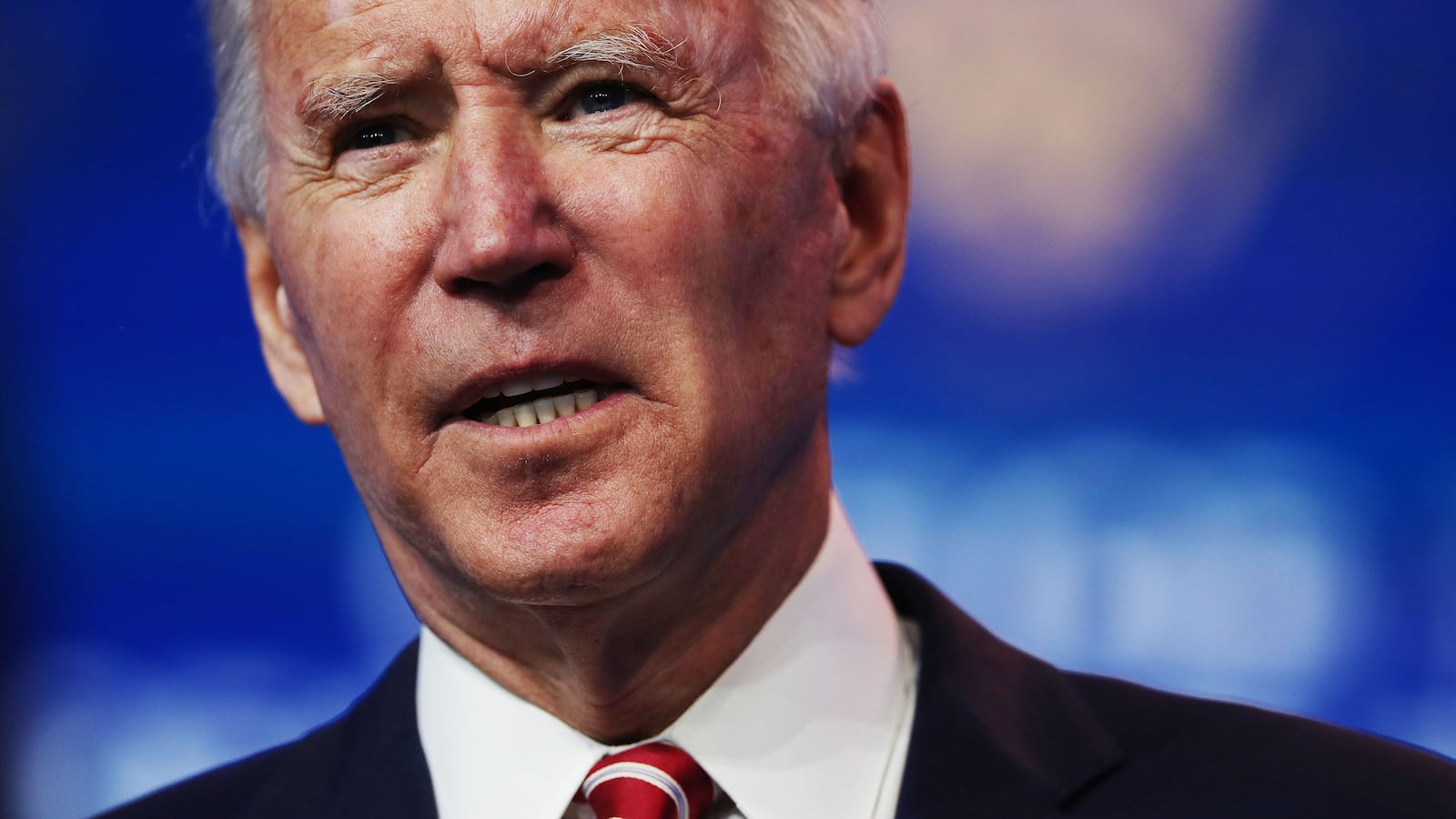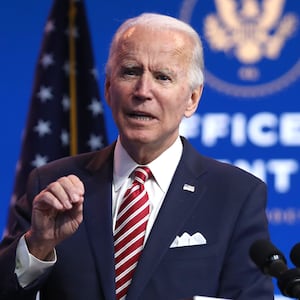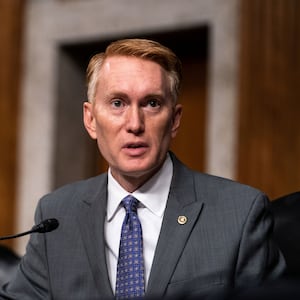For most politicians, having a federal law named in your honor is an enormous achievement—particularly when the legislation furthers your lifelong goal of ensuring a smooth transfer of power between presidential administrations.
But for Ted Kaufman, the Ted Kaufman and Michael Levitt Presidential Transitions Improvements Act of 2015 has become an irksome burden.
That’s because Kaufman is now co-chair of President-elect Joe Biden’s transition team. And the act he helped author is complicating the process he must now complete, so much so that it’s become the potential target of a legislative do-over once the transition is over.
“It’s what happens when efforts at good government run headlong into the machinations of a demagogue,” said William Howell, a political science professor at the University of Chicago and director of the school’s Center for Effective Government, summing up the conflict between the legal infrastructure for presidential transitions and a sitting president who, ultimately, doesn’t want a transition at all. “When trying to reduce inefficiencies and lay the groundwork for effective government, one will always remain vulnerable to the work of a populist who wants to undermine the capacity of government to function—and will leverage whatever control is at his disposal.”
The roots of the Ted Kaufman and Michael Levitt Presidential Transitions Improvements Act are found in the chaotic transition between the Clinton and Bush administrations in 2000. That contested election, and resulting Florida recount, delayed the beginning of the transition by nearly a month. The delay was later cited by the 9/11 Commission as having “hampered the new administration in identifying, recruiting, clearing and obtaining Senate confirmation of key appointees,” potentially impeding the federal response to the terror attacks of September 11, 2001.
The political liabilities of preparing for transition have also created incentives against putting incoming presidents doing lengthy prep work. In 2008, Republican nominee Sen. John McCain of Arizona blasted Democratic nominee Barack Obama for “measuring the drapes” when he formed a transition team, despite McCain operating one of his own.
The Kaufman-Levitt bill “gave political cover for transition preparation to be happening aggressively and publicly,” said Max Stier, president and CEO of the Partnership for Public Service, which houses the Center for Presidential Transition. Stier, who helped shape the Presidential Transitions Improvements Act, said that before the reforms, “campaigns were scared to do too much in the way of transition work because… that would create a political vulnerability for them.”
Under the terms of the Presidential Transitions Improvements Act, material and logistical support for a transition would be greatly expanded following the election of a new president. The bill, named for the Utah governor who was tasked with building Mitt Romney’s titanic transition operation—he once quipped that “we built a great ship, we never got a chance to sail it”—and for Kaufman, who served in the same capacity for the Democrats in 2008, passed unanimously by voice vote in March 2016. The law was crafted as successor legislation to Kaufman’s Pre-Election Presidential Transition Act of 2010, which directed the General Services Administration (GSA) to provide office space and technical support to major-party presidential candidates following their formal nomination.
Among its provisions, the law mandated the creation of a White House transition coordinating council, the appointment of a senior employee at every federal agency as a point-person for transition efforts, and the designation of a senior career appointee to carry out the agency’s duties relating to presidential transitions.
But a built-in mechanism of transition unaddressed by the government has now created a political and logistical nightmare. As President Donald Trump refuses to concede an election he has manifestly lost, the GSA official tasked with officially kicking off the transition, administrator Emily Murphy, has refused to sign off on the election results, a process called “ascertainment” which allows for the release of millions of federal dollars to pay for the transition and enables senior administration officials to coordinate with their successors.
Murphy, like many political appointees in the Trump era, appears to be caught between the reality of the law and the histrionics of the president, Howell said—emphasizing the dangers of essentially handing over ascertainment determination to a single political appointee, and a lack of imagination on the part of the bill’s drafters.
“Because the head of the GSA is a political appointee, [Trump] can leverage his influence over that political appointee in order to advance his goals,” Howell said. “It’s precisely under those conditions that we would want to insulate people who make such decisions from political interference, and currently, we can’t.”
Experts consulted by The Daily Beast differed on the point of whether the legislation signed into law in 2016 explicitly put ascertainment on the shoulders of the GSA administrator. But it left enough ambiguity to create the situation in which the government currently finds itself.
“The law itself finalized what was the practice, but not of the ‘shall’ kind—more of the ‘may’ sort,” said Terry Sullivan, a professor emeritus of political science at the University of North Carolina, Chapel Hill and executive director of the White House Transition Project. “It turned out that an administration running for re-election tended to stretch the may part in favor of other duties (like getting elected).”
If past is prologue, Trump’s chaotic administration—defined by high turnover and a historic number of unfilled government posts—should have tipped off the Biden transition that the handover of government power would be equally turbulent.
“The Biden administration is really dependent on the information and cooperation the Trump administration wants to give, and that’s not an ideal position to be in,” Wright said. “But it’s just an element where the personal presidency tends to overtake the institutional presidency.”
As Kaufman steers Biden through perhaps the rockiest transition in modern history, the act’s name has become bitterly ironic—exacerbating the very hurdles erected on the path to Inauguration Day with which the former Delaware senator must now contend.
“It’s just an example of another area in which Trump has really forced us to recognize the difference between something that is required by law and enforceable—and those are two different things,” said Lauren A. Wright, an associate research scholar and lecturer in politics and public affairs at Princeton University.
The crisis, like the Bush-Gore election fight before it, has revealed needs for a legislative update. Experts floated the possibility of granting the power of ascertainment to a career civil servant, rather than a political appointee, or to a board subject to party balancing requirements.
“There are some clear lessons to be learned, and improvements that could be made, on the law,” Stier said, “including really being more specific about what triggers the ascertain requirement, and ensuring that that trigger is a very low bar.”
But the longest-lasting solution, they agreed, was to elect leaders who care about a humming bureaucracy as much as they care about winning the election.
“We’re always completely vulnerable to the threats that demagogic populists present,” Howell said. “The answer can’t just be getting the institutions exactly right. It also requires a measure of vigilance on our part.”
“The thing to do now is not to say oh my God, how foolish those people were in adopting that law—actually, they were really quite thoughtful,” added Howell. “And yet these vulnerabilities persist, and yet the need for continued vigilance and experimentation persists. There’s not going to be a moment where we get the law exactly right, and I think a thing that we’ve observed with the Trump administration is just how destructive a populist president can be.”






